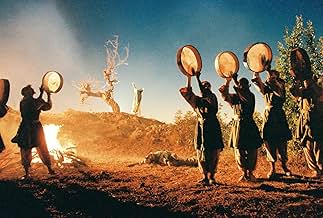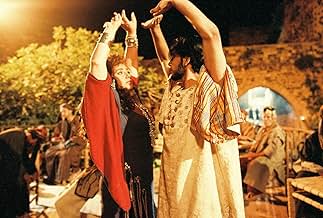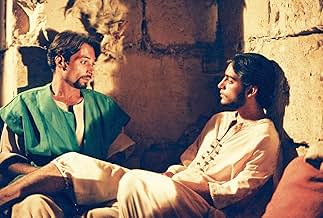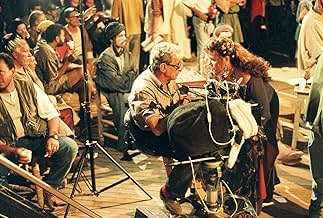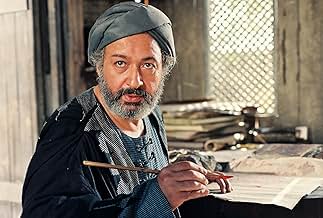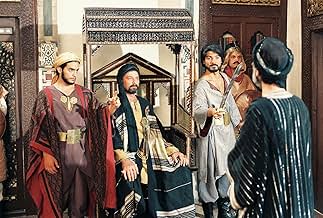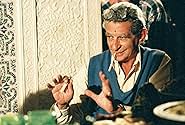Ajouter une intrigue dans votre langueThe story is set in the 12th century in Arab-ruled Spanish province Andalusia, where famed philosopher Averroes is appointed grand judge by the caliph and his liberal court judgments are not... Tout lireThe story is set in the 12th century in Arab-ruled Spanish province Andalusia, where famed philosopher Averroes is appointed grand judge by the caliph and his liberal court judgments are not liked by everyone. The caliph's political rivals, centered around the leader of a fanatic... Tout lireThe story is set in the 12th century in Arab-ruled Spanish province Andalusia, where famed philosopher Averroes is appointed grand judge by the caliph and his liberal court judgments are not liked by everyone. The caliph's political rivals, centered around the leader of a fanatical Islamic sect, force the caliph to send Averroes into exile, but his ideas keep on livin... Tout lire
- Réalisation
- Scénario
- Casting principal
- Récompenses
- 2 victoires et 1 nomination au total
- Averroes
- (as Nour El Cherif)
- Al Mansour, The Caliph
- (as Mahmoud Hemeida)
- Averroes' Wife
- (as Safia El Emary)
- Nasser, The Crown Prince
- (as Khaled El Nabaoui)
- The Caliph's Brother
- (as Seif Abdel Rahman)
- Emir of the Sect
- (as Magdi Idris)
- Gaafar
- (as Hasan El-Adl)
Avis à la une
The film had a great deal of technique and style. Although the film is set in the past, the language of the script is in colloquial Arabic, which is spoken on the streets of Egypt at this point in time. Making delivering the content of the words more important than giving the audience a believable setting. Aside from being a historical representation it was a philosophical thought on religion, society and politics. Some of the obvious themes in the film were as follows. The freedom of thought expressed in the power of the written and spoken word as a form of representation of the people, what they stand for, and their sufferings. In addition to the self and social destruction caused by ones political motivation hidden behind a religious façade.
Finally the film brings great memory of Francois Truffaut's `Fahrenheit 451'-. In making the point that one can burn all the books in the world, but that would never take what is in the books away from the people, because true words, weather written or memorized, are humanities memory and being till the end of time. Both films complement each other, one can darlingly view, `Al-Massir' as the beginning of a time that was elaborately explored in `Fahrenheit 451.' Both films had the same ending, in which the books were burnt and the words were kept in the memory of the people, independent of what the present political power did. The words of scholars, philosophers and story tellers live forever.
The movie has one of the grimmest beginnings I've ever seen. It never gets quite that grim again, but the first few minutes are hard to sit through.
After that, the story is interesting, if hard to understand. The philosopher Averroes was a historical figure. He sometimes lived in North Africa, and sometimes in Andalusia. (Nour El-Sherif is an excellent actor, and he makes us believe in Averroes as a real human being, and not just as a philosopher on a pedestal.)
Averroes translated the works of Aristotle into Arabic, and then he wrote commentaries about them. It's possible that these works would have been lost if Averroes had not undertaken this immense intellectual task.
The basic plot of the story circles around the interaction of Averroes with the Caliph, and the Caliph's brother and sons. I have to admit that I got the sense of who was doing what to whom, but I couldn't always understand the details.
This movie is worth seeing because it's colorful, well-acted, and shows us events about which many of us know very little. It has a solid IMDb rating of 7.3, and I recommend it. It will work better on the large screen.
We were able to see it at Rochester's wonderful Dryden Theatre where it was shown--free--as part of a series entitled Salam. The series is being presented to commemorate the lives of the victims of the atrocities at the Al Noor Mosque and the Linwood Islamic Centre in New Zealand, and in solidarity with Muslim people.
The series was organized by the Eastman Museum in partnership with the Islamic Center of Rochester. I commend both institutions for using artistic works to combat and decry hatred.
Le saviez-vous
- AnecdotesAccording to an interview actor Nour El-Sherif stated that the role of Ibn Roshd was supposed to be played by director Youssef Chahine himself, but Nour told him that he was not suitable for the role.
- Citations
Caliph's brother: Thoughts have wings. No one can prevent them from flying.
- ConnexionsFeatured in Humbert Balsan, producteur rebelle (2006)
- Bandes originalesAlli sotak
and "Gamr el Hawa", words by Sameh El Kodoussi and Kawssar Mostapha, music by Kamal El Tawil
Performed by Mohamed Mounir
Meilleurs choix
- How long is Destiny?Alimenté par Alexa
Détails
- Date de sortie
- Pays d’origine
- Langues
- Aussi connu sous le nom de
- Destiny
- Lieux de tournage
- Krak des Chevaliers, Syria(sect training grounds)
- Sociétés de production
- Voir plus de crédits d'entreprise sur IMDbPro
Contribuer à cette page


